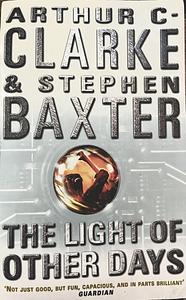Take a photo of a barcode or cover
informative
reflective
medium-paced
Plot or Character Driven:
Plot
Strong character development:
Yes
Loveable characters:
No
Diverse cast of characters:
No
Flaws of characters a main focus:
Yes
Conceptually this book is really interesting. The idea of complete loss of privacy is topical and worth exploring. Unfortunately the execution in this book is wanting. It's very clearly an Arthur c Clarke idea, but not an Arthur c Clarke execution.
The sci-fi concepts are thought provoking and fully realized, but the characters are hard to empathize with, particularly as the novel nears the end.
Decepcionante
1. Prefiero mil veces el final deprimente y oscuro de "El fin de la infancia" porque no me terminó de convencer esa idea de que todos reviven y son felices en el espacio, (dejando de lado la cuestion de si el individuo sería realmente el mismo que fue alguna vez) si pertenecen a la mente unificada ¿realmente son individuos? y ¿cuál es la necesidad de imponer a gente de la edad de piedra o que vivió a principios del siglo XX a la vida de altísima tecnología en el espacio? Considero que el planteamiento final va en contra mi filosofía del final y mi adoración a la muerte; además es claro que esa gente no sabe superar las cosas, que si la gente sufrió y la historia está llena de sangre, pero lo pasado, pisado.
2. Como libro es decepcionante; tienes esta idea super genial de una tecnología que borra la vida privada y permite ver TODO como realmente es y como realmente fue, me prometen que será (obviamente) algo que sacudirá la sociedad, y lo que obtuve fue una muestra muy breve de eso y más de Bobby y sus putos traumas, y Kate siendo insoportable. Yo no quería ver a los personajes y cómo cambiaban sus vidas, quería ver a la sociedad en conjunto cambiar, convulsionarse; demonios había tantas posibilidades de especular con el impacto social de semejante cosa y fue decepcionante: tenían putas guerras por agua, un puto asteroide que de seguro iba a impactar la Tierra, tecnología asombrosa, la posibilidad de ver la historia, y al final NADA.
Esa parte de la retrospectiva de los antepasados en realidad prometía mucho, en especial cuanto más retrocedían, pero al final también se quedó en el aire para mi, incluso con el símil perfecto que expusieron con el mito de Sísifo.
1. Prefiero mil veces el final deprimente y oscuro de "El fin de la infancia" porque no me terminó de convencer esa idea de que todos reviven y son felices en el espacio, (dejando de lado la cuestion de si el individuo sería realmente el mismo que fue alguna vez) si pertenecen a la mente unificada ¿realmente son individuos? y ¿cuál es la necesidad de imponer a gente de la edad de piedra o que vivió a principios del siglo XX a la vida de altísima tecnología en el espacio? Considero que el planteamiento final va en contra mi filosofía del final y mi adoración a la muerte; además es claro que esa gente no sabe superar las cosas, que si la gente sufrió y la historia está llena de sangre, pero lo pasado, pisado.
2. Como libro es decepcionante; tienes esta idea super genial de una tecnología que borra la vida privada y permite ver TODO como realmente es y como realmente fue, me prometen que será (obviamente) algo que sacudirá la sociedad, y lo que obtuve fue una muestra muy breve de eso y más de Bobby y sus putos traumas, y Kate siendo insoportable. Yo no quería ver a los personajes y cómo cambiaban sus vidas, quería ver a la sociedad en conjunto cambiar, convulsionarse; demonios había tantas posibilidades de especular con el impacto social de semejante cosa y fue decepcionante: tenían putas guerras por agua, un puto asteroide que de seguro iba a impactar la Tierra, tecnología asombrosa, la posibilidad de ver la historia, y al final NADA.
Esa parte de la retrospectiva de los antepasados en realidad prometía mucho, en especial cuanto más retrocedían, pero al final también se quedó en el aire para mi, incluso con el símil perfecto que expusieron con el mito de Sísifo.
Arthur siempre sabe cómo hacerte soñar y en este libro no se queda corto. Si bien tiene partes lentas, sus escenas reconstruyendo la historia son muy vívidas y emocionantes. Habiendo leído su otra colaboración con Baxter (El ojo del tiempo), esta novela en comparación sufre, quizá porque cuesta que te atrape en un principio. Sin embargo, te da mucha emoción, te hace pensar, y te sorprende en muchas partes, que es todo lo que uno espera de la ciencia ficción.
This collaboration was entertaining and terrifying in its speculation about possible applications of a technology that allows anyone to view anything anywhere present or past. In some ways the book almost felt like a collection of short stories exploring ideas such as:
- how would the ability to observe the life of Jesus Christ first hand impact a Catholic's faith?
- how would politicians cope if all their decisions and deals were made in a panopticon?
- how would a complete lack of privacy from birth impact a teenager's perceptions of sex, nudity, and shame?
The list could go on forever, and the book seemed tempted.
I thought it read more like a collection of pieces than a unified novel because the central characters were so thinly drawn. The characters were surrounded by over the top drama - murder, mayhem, and the like. Unfortunately, the lack of development made this all seem comical as the reader had almost no opportunity to develop an emotional attachment to the characters.
- how would the ability to observe the life of Jesus Christ first hand impact a Catholic's faith?
- how would politicians cope if all their decisions and deals were made in a panopticon?
- how would a complete lack of privacy from birth impact a teenager's perceptions of sex, nudity, and shame?
The list could go on forever, and the book seemed tempted.
I thought it read more like a collection of pieces than a unified novel because the central characters were so thinly drawn. The characters were surrounded by over the top drama - murder, mayhem, and the like. Unfortunately, the lack of development made this all seem comical as the reader had almost no opportunity to develop an emotional attachment to the characters.
Excellent treatment of a world with no privacy and time travel into the past. The ending was very Clarke-like; lame and unsatisfying but everything else was top-notch.
The book is based on a novel concept where a rich, egoistic billionaire invents technology to stabilize wormholes for communications. As a side effect, they discover that the cam can also look into the past. All this while, death and doom for all of humanity is only 500 years away as a massive asteroid is on an impact trajectory with Earth.
I'd say there is enough plot here to keep you busy. In all these events, the main focus of the story mostly revolves around people and how they react when the concept of privacy is shattered. A study of the past through the wormcams is also something of major interest to the people and its safe to say that if such a technology was available to me, I'd be looking into various eras to see what was happening too. There is just so much history to explore.
Some parts of history are handled quite well by the authors. There is a chapter devoted to looking at the birth of Christianity. The end of the book is pretty much devoted to looking all the way back into our origins from single-celled organisms to what we are today.
Overall the book was enjoyable even though the plot was a bit slow in some places. The concept is amazing and it's all laid out well.
I'd say there is enough plot here to keep you busy. In all these events, the main focus of the story mostly revolves around people and how they react when the concept of privacy is shattered. A study of the past through the wormcams is also something of major interest to the people and its safe to say that if such a technology was available to me, I'd be looking into various eras to see what was happening too. There is just so much history to explore.
Some parts of history are handled quite well by the authors. There is a chapter devoted to looking at the birth of Christianity. The end of the book is pretty much devoted to looking all the way back into our origins from single-celled organisms to what we are today.
Overall the book was enjoyable even though the plot was a bit slow in some places. The concept is amazing and it's all laid out well.
Excellent Science Fiction book involving instant communication and it's effect on society.



